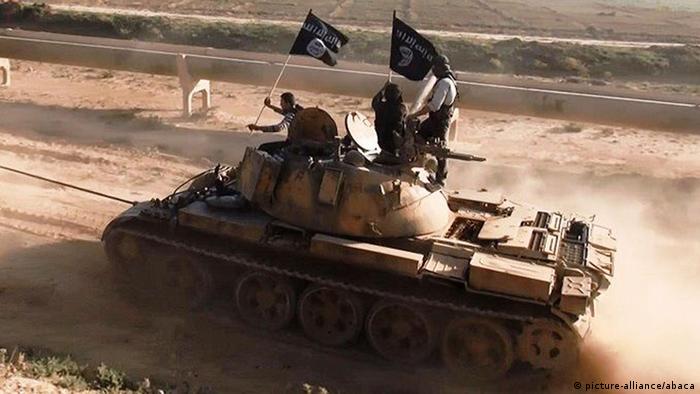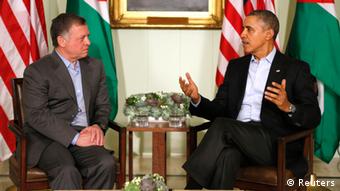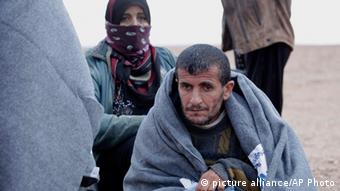Anger boils over in the 'Fallujah of Jordan' | ||
Al-Qaeda flags have been raised in Maan, where residents say they are tired of police brutality and a lack of services.
Areej AbuqudairiLast updated: 05 Jul 2014 10:28
| ||

Angry residents have burnt shops and banks in Maan in protest of what they see as government neglect [Reuters]
| ||
| Maan, Jordan - This southern city - known for violence, riots, and clashes - received worldwide attention last week when new chants and flags were raised, alarming Jordanian authorities. Dozens of men carried a banner calling the southern city the "Fallujah of Jordan". Waving al-Qaeda flags as they chanted sectarian-inspired slogans, they celebrated the military gains of the Islamic State of Iraq and Levant (ISIL) - the group that has since re-named itself the Islamic State - in neighbouring Iraq. Security officials immediately summoned the protest's organiser, Issam Abu Darwish, a 38-year-old engineer working for Maan's municipality, for investigation; his family said they have not heard from him since. Abu Darwish's brother, Ahed, said his brother organised the march in support of Sunni Muslims that are oppressed in Iraq. The Jordanian authorities and Salafist leaders both denied any links to the Maan protest, and said there is no organised branch of ISIS in Jordan. "It is just a group of six men who organised the protests as individuals," said the governor of Maan, Ghazi Shamaylah.
"If there is a leadership for ISIS in Jordan, they should come out to the public," Abu Sayyaf added. RELATED: Discontent simmers among East Bank Jordanians For many, support for these groups stems from growing frustration with police violence in Maan. According to residents and local activists, police violence has left ten people dead this year, mostly during police raids and searches. "The police can arrest whoever they think presents a threat to the society, but they must be turned into [the] justice [system], not killed by police officers," said Anas Abu Karaki, a professor of IT at the University of King Hussein in Maan. Abu Karaki said raising ISIS flags could lead to a further crackdown on residents. "I am Muslim too, and these guys are Maanis, too. But our main concern is combating police violence against our people," he told Al Jazeera. Located 220km south of Amman, Maan was the epicentre of Jordan's "April Awakening" in 1989, when protests erupted over a raise in the price of commodities, and spread to the cities of Karak and Salt, among others. The protests then evolved to a demand for more basic freedoms in Jordan, and as a result, martial law was lifted in the Kingdom and parliament was re-instated after being suspended for eight years. But since then, the city's residents - numbering about 100,000 people - say they have been marginalised from the government's developmental projects. The city has an unemployment rate of 19 percent, as opposed to the average of 12.1 percent nationwide. Maan also has the highest poverty rate, at 24.1 percent, compared to a national average of 13.1 percent, recorded in 2010. According to Hassan Abu Hanyah, an expert on Salafist movements in Jordan, ISIS attracts young people from poorer areas like Maan. "Such extreme organisations work when there are problems… such as sectarianism," he said. "Although Jordan does not have the Sunni and Shia division, it has social, economic and security problems it needs to address," Abu Hanyah told Al Jazeera. RELATED: Jordan fears fallout as Iraq crisis worsens On June 25, young, mask-wearing men raised al-Qaeda flags during a protest against the killing of a Maan resident, Aref Abu Darwish. Abu Darwish was killed during a Jordanian SWAT team raid on his house - an attempt to arrest his brother Mehdi Abu Darwish - that left two other family members injured, including one in critical condition. "If they do not stop killing our people, we are all becoming ISIS," said a protester in his 30s, who didn't give Al Jazeera his name, as he chanted, "Freedom is from Allah, Go Away Abdullah", referring to the King Abdullah II. Protesters also called for sacking the Interior Minister, Hussien Majali, and Prime Minister Abdullah Ensour. The Jordanian government refused to comment on these matters despite repeated Al Jazeera requests, while the Ministry of Interior Affairs referred Al Jazeera to the Maan governor. The governor, Shamaylah, told Al Jazeera that police were trying to arrest Aref's brother, Mahdi Abu Darwish, who is wanted for serious crimes, without specifying what these crimes were. His family denied the allegations.
Meanwhile, the Abu Darwish family refuses to bury Aref. "We will not [bury him] until the government apologises for this massacre they held at our house," said his sister Nisreen, a 23-year-old schoolteacher. Sporting purple bruises over her legs, she told Al Jazeera gendarmerie officers kicked her as she was trying to defend her brothers, and shocked her with a taser. "I never supported extremism or chaos in our country, but now that we felt the bitterness of injustice and humiliation at our home, I have come to believe if you are [from Maan], you are wanted," she said. A month ago, violent riots erupted in Maan and lasted for almost a week after a resident was killed by a police officer. Jordan's Interior Minister, Hussien Majali, told parliament then that the government was conducting an arrest campaign for 19 "dangerous people", wanted for issues like drugs and theft. After the latest round of violence, The National Center for Human Rightsissued a statement calling for calm and condemned the "excessive use of force" and "horrifying raids" on communities in the search for wanted suspects. RELATED: Jordan reels from week of violence in Maan With the security situation deteriorating in neighbouring Iraq, the Jordanian authorities have intensifiednational security by sending troops to the Iraqi border and by allocating emergency funds to recruit 3,000 gendarmerie forces for this year. Further, after passing its amended controversial anti-terror law, which broadens the definition of terrorism, the Jordanian authorities have made it impossible for Jordanian fighters - which analysts and Salafist leaders estimate to number between 1,800-2,000, fighting in Syria and Iraq - to return to their country. Early this month, a military court sentenced four men to between two-and-a-half to four years in prison for joining or attempting to joining opposition groups fighting in Syria. Last week, ministers and parliamentarians held a meeting to discuss the situation in Maan and the challenges facing Jordan. The media was denied access to the meeting. To stem these tensions, critics say it is time for the Jordanian authorities to make serious improvements to the country's economic and social problems. "Jordan should address problems in Maan before it is too late," said Jordanian writer and political analyst Mohammad Swedan. "They often talk about developmental programmes over there, but it is either such programmes are not real, or they need to rethink how they are doing things." | ||
Source:
Al Jazeera
| ||
Anti war....
Israel Vows Aid to Prevent ISIS Invasion of Jordan
Militants Say Attacking Jordan Remains a Priority
by Jason Ditz, July 04, 2014
An al-Qaeda militant from Jordan says that attacking the Hashemite Kingdom, as well as neighboring Israel, remains a “priority” for international jihadists, urging the Jordanian government to reform along the basis of al-Qaeda’s interpretation of Sharia Law.
 Al-Qaeda may only be a secondary threat for Jordan at this point, however, after ISIS recently took the Iraqi side of the common border, forcing Jordan to build up military forces at the crossing to try to prevent an ISIS incursion.
Al-Qaeda may only be a secondary threat for Jordan at this point, however, after ISIS recently took the Iraqi side of the common border, forcing Jordan to build up military forces at the crossing to try to prevent an ISIS incursion.
Israel is taking notice too, as Jordan is one of the few regional allies they haven’t totally alienated, and Strategic Affairs Minister Yuval Steinitz says Israel will provide “all help” necessary to keep ISIS out of Jordan.
Steinitz cited Israeli plans to intervene in a brief 1970 Jordan-Syria skirmish as part of their policy, but said that as with 1970 they believe Jordan is capable of defending the border themselves, and that ISIS poses no actual threat to take the country.
DW.....
MIDDLE EAST
ISIS: Iraq today and possibly Jordan tomorrow
Don't be fooled by its name: The terror group "Islamic State of Iraq and Syria" plans to attack well beyond the borders of those two countries. After snatching an Iraq-Jordan checkpoint, Amman is on high alert.
The Jordan-Iraq border crossing is a solitary post, located in the endless yellow-brown desert between Jordan's capital, Amman, and Baghdad, Iraq.
The Iraqi customs officials there are supposed to monitor entry and exit to the country. But the Iraqi-Jordan border crossing has nothing more to report to Iraq's central government: Members of a Sunni militia allied with the terror group Islamic State of Iraq and Syria (ISIS) are now in control.
While the overrun border outpost is just another piece in the ISIS Iraq puzzle, it is raising alarm in Amman. Jordan's interior minister announced that his country is now "surrounded by extremists." Troops stationed on Iraq's border have been placed on high alert. According to domestic military sources, the kingdom has mobilized dozens of units along the border.
Washington is concerned as well. President Obama warned that the jihadist march could spread to Jordan from Iraq. US Secretary of State John Kerry considers ISIS "a threat to the whole region."
Increased security measures
André Bank, a Middle East expert at the Hamburg-based German Institute of Global and Area Studies (GIGA), says the group's goal is to establish in Islamic state in Iraq as well as "Greater Syria."
"That means not only Syria, parts of Iraq, Lebanon and large parts of [historical] Palestine, but also large areas of Jordan," he told DW.
That territorial claim can be seen in an ISIS propaganda video released last week on the Internet. In it, five fighters, apparently from the UK and Australia, speak to the camera.
"We don't recognize borders," one of the men says, adding that he and his comrades had fought in Syria, would soon enter Iraq and would then enter Jordan and Lebanon - "wherever our leader sends us."
It's likely straight propaganda. André Bank considers it somewhat unrealistic for ISIS fighters to penetrate Jordan. Where in Iraq they've encountered a demoralized army giving up large swathes of territory without so much as a fight, Jordan's military would engage.
"Jordan's security apparatus is one of the strongest in the region. Border facilities will be strongly protected," he said.
Rising threat
What ISIS might do is destabilize Jordan through terror attacks. It wouldn't be the first time the country found itself targeted by terrorists. In 2005, more than 50 people died in separate terror attacks on luxury hotels. The precursor to ISIS, Al Qaeda in Iraq, claimed responsibility. At that time the group was led by a Jordanian, Abu Musab al-Zarqawi, who was killed one year later in a targeted US air strike just 50 kilometers (31 miles) north of Baghdad.
Ramzy Mardini is an Amman-based security expert with the nonpartisan US think tank Atlantic Council. He believes the radical ISIS group might have already established a terror cell within Jordan. The country is home to a growing number of jihadists, he says, a fact shown Friday (20.06.2014) when 200 ISIS supporters took to the streets in the southern Jordan city of Maan and openly declared it the "Fallujah of Jordan" - a reference to the Iraqi stronghold of radical Sunni Islam.
But, according to Jordan's former foreign minister, Marwan Muasher, a "large majority of the population" in Jordan is against the extremist ISIS.
Muasher, the current vice president at the Carnegie Endowment research institute, added that "the danger ISIS presents to Jordan is not comparable to the danger the organization represents for Syria or Iraq."
ISIS is a security threat, he says - not an "existential danger."
Reforming a stable Jordan
Jordan's head of state, King Abdullah II, is still in the drivers seat, says André Bank - partly due to support from Western states, from Israel but also from Gulf monarchies.
Still, the country faces big problems. Refugees from Syria number in the hundreds of thousands. Its economy is sputtering, causing increased unemployment.
As Berlin welcomes Jordan's king on Tuesday, where he will meet with German Chancellor Angela Merkel, Bank sees a need for at two-pronged approach: Jordan's refugee burden must be better supported; any long-term help delivered by Germany, he says, should come with preconditions for reform.
That's because extremism will continue to take root in Jordan, the Middle East expert says, unless the increasingly authoritarian country further opens itself politically and adopts an economic policy that's more socially balanced.







No comments:
Post a Comment